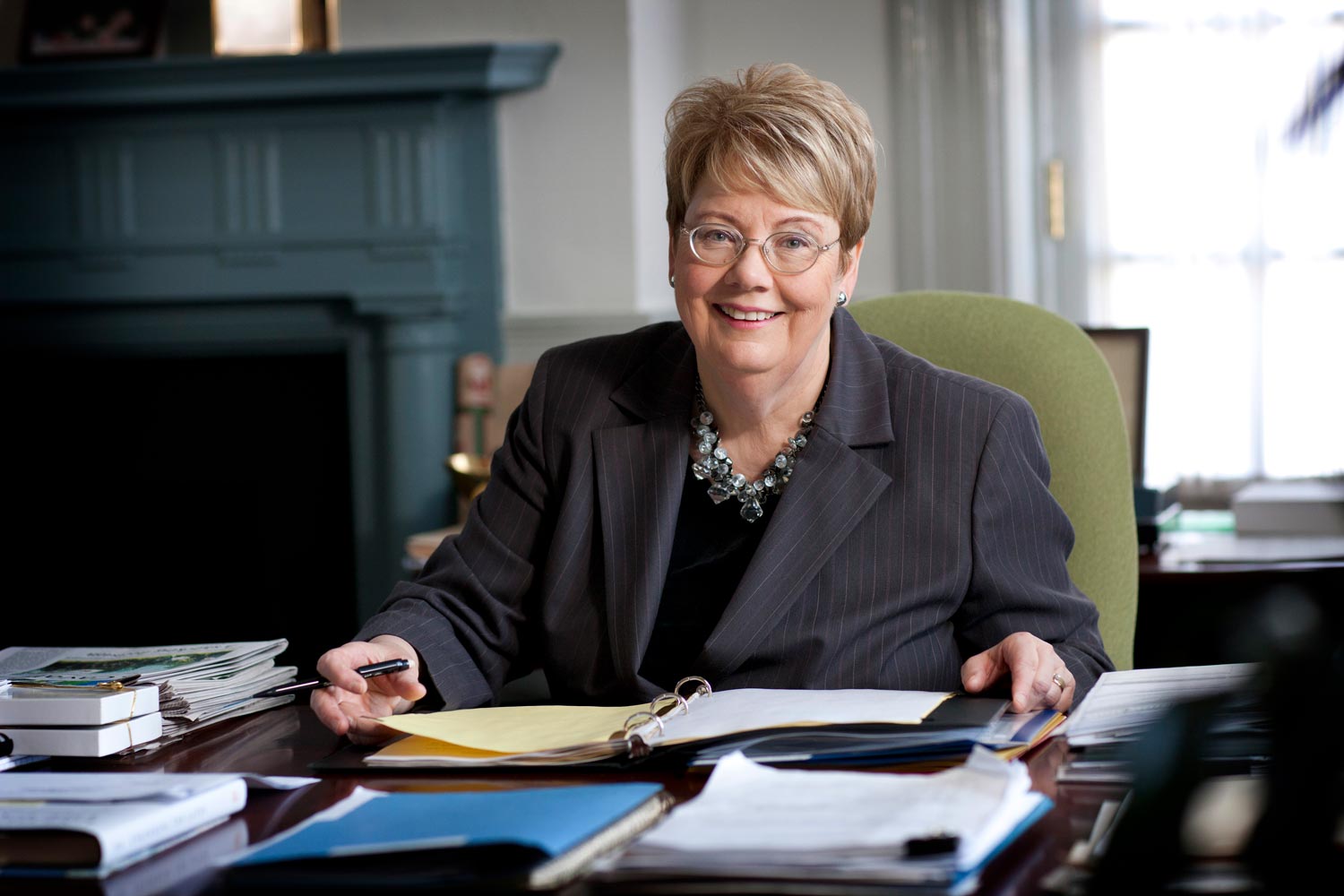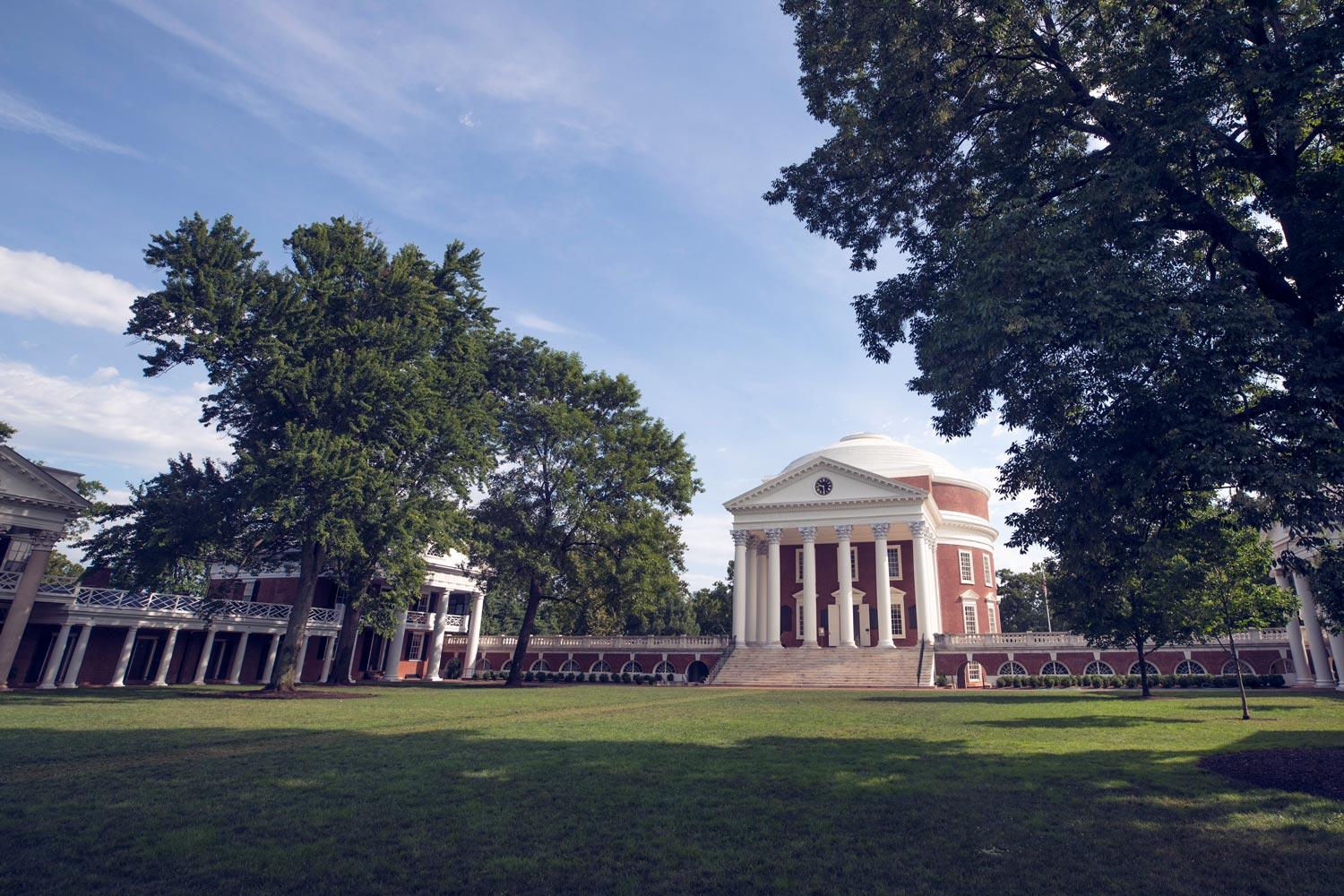Teresa A. Sullivan delivered her final report to the Board of Visitors as president of the University of Virginia on Friday. Here are the remarks, as prepared:
After eight years as president and dozens of board meetings, this will be my final “President’s Report” to the Board of Visitors. So let me begin by saying a heartfelt “thank you” for your hard work and your support over the years.
We’ve experienced euphoric high points, such as last October’s launch of the Bicentennial Celebration. And we’ve experienced challenging low points, such as the attack on our Grounds last August by protesters espousing white supremacy, anti-Semitism and other messages of hate.
We’ve come together in a spirit of joy to celebrate the high moments, and we’ve come together in a spirit of determination and resolve to surmount the low moments. Through both the highs and the lows, we’ve remained true to our values, and that’s one of the main reasons that UVA remains strong.

Photo by Dan Addison, University Communications
Instead of giving you a farewell speech, I want to leave the board with a simple question. This is the question:
Can UVA continue to be both public and excellent in the future?
I believe the answer to that question is “yes.” UVA most certainly can remain both public and excellent in the years ahead, but it will require diligence on the part of this board and on the part of UVA leaders at every level.
Diligence is required because there are so many short- and long-term threats to public higher education. Examples include the increasing push for regulation and the misplaced blame for problems in higher education, problems such as the rise in student indebtedness. This particular problem belongs mainly to the private, for-profit schools that saddle students with high debt while giving them a mediocre education, or worse. And yet public higher education is often the target of criticism.
We have a duty to the Commonwealth of Virginia to take seriously UVA’s mission as a public university. But our duty to the commonwealth is best carried out when we seek excellence.
Some critics say that being public and being excellent are mutually exclusive. You must choose to be either one or the other, they say; you cannot be both.
UVA has a history of solving that “either/or” problem with creative solutions. Back in the early 1990s, when UVA faced a series of significant cuts in state budget support, University leaders faced a question: “Considering these new financial realities, should UVA accept mediocrity?”
Strong leaders such as John Casteen, Leonard Sandridge, members of the Board of Visitors at that time and others said, “No.” They refused to accept mediocrity as an option for UVA. Instead, they led a charge, supported by the private philanthropy of UVA’s generous alumni, that propelled UVA into the upper ranks of great American universities.
Those leaders answered the question of mediocrity with an emphatic “no” back then. But the question never goes away.
With the many challenges facing public higher education, we must say “no” to mediocrity – we must make the choice to be excellent – day after day, year after year.
In recent years, we have said “no” to mediocrity and “yes” to excellence in numerous ways: with the goals and priorities that we articulated in the Cornerstone Plan; with the commitment to hiring a great faculty for UVA’s third century; with a dramatic rise in philanthropy, as we set records for total new commitments this year.
We said “no” to mediocrity in our research enterprise, and our sponsored research awards have grown more than 30 percent since fiscal year 2013.
We said “no” to mediocrity in our global programs, and we now have record numbers of students involved in study-abroad, J-term, internships, research, and service overseas, and we have many new international research partnerships, such as our partnership with Germany’s Max Planck Society.
We said “no” to mediocrity in our Jeffersonian buildings and Grounds, and now we have a restored Rotunda that’s serving as a vital center of life for our students. More than a quarter-million visitors have passed through the Rotunda since its reopening.
This board said “no” to mediocrity when it launched the Strategic Investment Fund two years ago, and now we have the Bicentennial Professors and Bicentennial Scholars; we have enhanced programs in neuroscience and individualized medicine for diabetes; we have the Democracy Initiative, the LinkLab for cyber-physical systems, and other centers of excellence.
We said “no” to mediocrity in our Health System, and now we have the No. 1 hospital in Virginia. We said “no” to mediocrity once again when we launched a new research and education partnership with Inova Health System in Northern Virginia.
UVA’s College at Wise has said “no” to mediocrity time after time, and Chancellor Henry and her team have led a resurgence on the Wise campus.
In every corner of the University of Virginia, we have said “no” to mediocrity and “yes” to excellence, and the results are on display everywhere you look at UVA.
To aspire to be both public and excellent in today’s challenging environment for public higher education seems to represent a paradox, because the demands seem to be in conflict with one another – irreconcilable, unresolvable.
The Danish physicist Niels Bohr won the Nobel Prize in 1922 for his study of the structure of atoms and his investigation of Quantum Theory. Around that time, he famously said, “How wonderful that we have met with a paradox. Now we have some hope of making progress.”
Faced with an apparent paradox, UVA has made great progress in recent years.
In the days ahead, President-elect [James] Ryan and the members of this board will carry on the daily necessity of saying “no” to mediocrity and “yes” to excellence for UVA. As you prepare for the hard work ahead, I wish you the very best.
Media Contact
Article Information
June 8, 2018
/content/sullivan-urges-board-continue-pursuit-excellence-over-mediocrity

